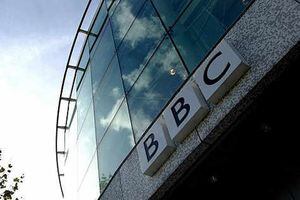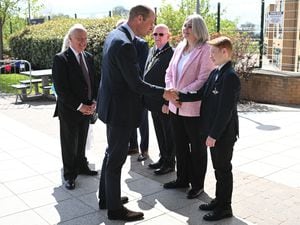Nigel Hastilow: BBC dinosaur faces extinction
There's a simple answer to the Government's dilemma over the BBC – privatise it.

It is one of the last giant State-owned monopolies, as efficient and entrepreneurial as British Rail, British Leyland and British Coal used to be when they were run by the Government.
The Corporation in all its forms, along with its archives, must be worth billions. The name alone is worth a fortune.
Every licence-fee payer is an equal shareholder. So a sell-off would give every viewer in the country a cash windfall and privatisation would free us from poll-tax TV.
It would also force the BBC to become a commercial broadcaster which behaved with the same efficiency as any other media company.
It would have to work for its money. It could charge a subscription for its services. It might choose to sell advertising or sponsorship.
Waste
It would learn not to waste so much. And it would realise the world did not owe the BBC a living.
It would no longer suffer from the delusion it had a divine right to be the national broadcaster. It might remember its purpose is to educate, inform and entertain not to preach, convert and undermine.
Thanks to the Conservatives' election win and the appointment of John Whittingdale as Culture Secretary, the future of the BBC has become a hot political issue.
David Cameron has given the job to a man who thinks the licence fee is 'worse than a poll tax' and 'unsustainable'.
This will have sent shivers of apprehension through the Corporation. Its charter – and with it the question of its income – has to be agreed with the Government and renewed by the end of next year.
The BBC would have us believe the series 'W1A' starring Hugh Bonneville (you know, him off 'Downton') is a comedy about the mad and zany life of our beloved State broadcaster.
The sad truth is it's more like a documentary. They really do have highly-paid executives with bizarre job titles who sit around all day 'brainstorming' in rooms called Tommy Cooper.
The BBC want us to give them credit for this satire because then, the high-ups suppose, we will think they're game for a laugh at their own expense.
They hope we will decide they must be good sports so we won't mind when they renew the licence fee and bump up the cost to a nice round £150 a year.
That's what they must have thought when they commissioned the second series and prepared to cover the General Election in the sure and certain hope they would help deliver an anti-austerity Labour-SNP coalition.
Instead, poor darlings, no-one was more surprised than the BBC's executives to discover David Cameron still at Number Ten and this time without the restraining influence of those nice, fluffy Liberals.
Much as we love and treasure bits of the BBC – and there is no doubt we do – it really is shamelessly left-wing.
Take the audience it threw at Nigel Farage. The UKIP leader wasn't alone in thinking he was dealing with as biased a group of lefties as the BBC could rustle up.
That's why, when the next Question Time audience was put together in Leeds, it turned out to be that rarity on the BBC – robust but politically-balanced. Everyone noticed, because it's so rare.
The BBC is often unware of its institutional socialism. It assumes everyone thinks in the same metrosexual, politically-correct, State-subsidised way. There is scarcely an employee of the Corporation who would vote Conservative.
For all its supposed Britishness, there are more SNP supporters at the BBC than there would ever be UKIP voters. And when it comes to the national debate over whether or not Britain should stay in the European Union, does anyone seriously expect the BBC to be impartial?
Borrowed
The Corporation gets more than £4 million a year in grants from Brussels and borrowed £141m from the European Investment Bank.
If it were forced to fend for itself on the open market, it would do very well. Despite its bias, the bizarre way it's governed and the huge sums it doles out to a few top bananas, it is still much-loved.
Yet its status as the voice of the nation has been seriously compromised by its failure to recognise 'the nation' extends beyond trendy Islington.
If it were privatised and we had to pay for its services, some would survive and many others would wither and die. That's no bad thing. The BBC is too big, it does too much and competes in areas which should be left to the private sector.
When money's no object, it's easy to waste it on new digital radio stations, extra TV channels and an enormously-expensive website.
We need a new, purposeful, competitive BBC which embraces the 21st century instead of lumbering on like a dinosaur under the delusion it still enjoys a monopoly and we hang on its every word. It doesn't, we don't and dinosaurs are extinct.





